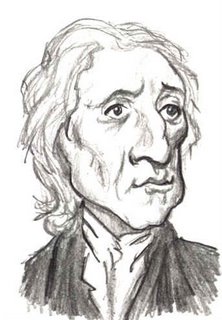Locke

It sometimes comes as a surprise to modern readers that John Locke, whose political theory had a direct influence on such movers and shakers as Thomas Jefferson, Edmund Burke and Jean-Jacques Rousseau, was a leading thinker in his day in such fields as the theory of knowledge, education and medicine; yet almost everywhere he applied his gifts, he sought to advance a natural foundation for liberation and tolerance.
Born on this day in 1632 in Wrington, Sussex, England, Locke grew up in the midst of Oliver Cromwell's turbulent Puritan Revolt against Charles I, and his father fought in the service of Cromwell's Parliamentarians. Young Locke attended Christ Church College, Oxford University, where his eyewitness experience of the Puritan Revolt no doubt led him to chafe within the scholastic confines of Oxford. While Oxford bred classical scholars, Locke was more interested in modern thought, chiefly the writings of Rene Descartes, whose star was rising on the continent. Locke graduated in 1656, obtained his master's degree in 1659, and sat in on natural science lectures given by Robert Boyle.
In his first philosophical work, Two Tracts on Government (1660-62), written at a time of political crisis and instability, Locke argued the conservative position that the formation of the state requires citizens to abandon their natural liberty and obey the commands of the sovereign, even where such edicts were not required by the laws of nature. In 1665, Locke acted as secretary on a diplomatic mission to Brandenburg, where he saw the success of a society founded upon religious toleration. Locke embraced the necessity of religious tolerance, except for atheists (whose aim, it seemed, was to strike down all morality) and Catholics (who were intolerant of other faiths by nature and constantly contradicting sovereign power by claiming superior authority).
On his return to Oxford, he found it in disarray due to the onset of the plague, and began to engage in medical research. Although he was not a physician, he was asked to become personal physician to Anthony Ashley Cooper, 1st earl of Shaftesbury, and in fact Locke successfully supervised an operation on Shaftesbury to remove a cyst from his liver.
Shaftesbury was convinced that Locke had saved his life, and the two became fast friends as well as philosophical comrades; Shaftesbury was also an avid proponent of religious tolerance. For better or worse, Locke found his fortunes tied to Shaftesbury: when Shaftesbury became lord chancellor in 1672, he named Locke his secretary of presentations, the lord chancellor's proxy for ecclesiastical matters; when Shaftesbury was dismissed, Locke lost his job. As Shaftesbury fell into increasing disfavor for his anti-Catholic brand of religious tolerance, after receiving his medical degree Locke escaped to France in 1675.
In and out of England, France and Holland during the next decade and a half, Locke was suspected of sedition by Charles II for his close ties with Shaftesbury, but Locke would not speak freely enough in the presence of Charles' spies to build a case for his arrest (although he was expelled from further privileges at Oxford). Nonetheless, by 1689, Locke had indeed shifted from the unquestionably loyal positions he took in the Two Tracts, and with the succession of William and Mary in 1688 he felt safe for the first time to publish the views he had been cultivating since the 1670s.
In his Two Treatises of Government (published 1689), he took on Robert Filmer's notion of the "divine right of royalty" to rule, advancing instead the notion of government as a relationship of trust. Outside of the state, humans are in a perfect state freedom, restricted only by natural law. In order to secure one's natural rights vis-a-vis others with competing interests, humans will forego their natural condition and, by "contract," enter a civil society in which personal freedoms are protected by the state and the will of the majority is otherwise followed. For Locke, the only end of government was to secure fully the natural rights of life, liberty and property, and governments which infringed upon these natural rights could rightfully be overthrown (he cited the "glorious, bloodless revolution" and arrival of William III in England as a worthy example of this principle at work).
In An Essay Concerning Human Understanding (published 1690), Locke performed a revolutionary critique on philosophical traditions of knowledge espoused by the Cambridge Platonists, who held that logical principles were innate tools of the human mind. In the spirit of ideological tolerance, Locke dismissed this somewhat authoritarian notion as a threat to freedom of thought; instead, he argued that humans are born as blank slates, and that experience (in particular, sensation and reflection) is the source of all ideas, even that which we understand as pure logic. Locke also analyzed, for the first time in the history of modern philosophy, the subjects of language and meaning as instruments of knowledge, observing that words imperfectly signify our imperfectly interpreted, imperfect sensations of the material world, but that we communicate ideas nonetheless through a practical tolerance of individual perceptions.
Locke had returned to England in the company of Mary II in 1689, and retired to the home of Lady Damaris Cudworth Masham (his some-time lover) and her husband Sir Francis Masham, settling in as the intellectual leader of the Whigs in Parliament. In his later years, he wrote shorter works on education, Christianity and economics. He died on October 28, 1704 in Oates, England.
Labels: Philosophy





0 Comments:
Post a Comment
Subscribe to Post Comments [Atom]
<< Home